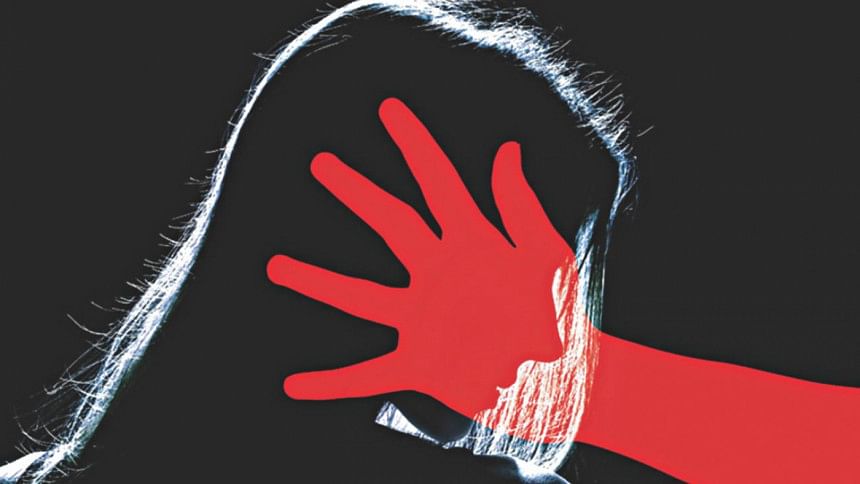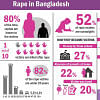Many rapists escape thru' loopholes

There are special laws and special courts to ensure justice for rape survivors. And yet, justice for most of them remains forever illusive. There are at least three guilty parties here -- defective investigation, incompetent prosecution and the law that favours the accused.
The result is this: 97pc rape cases in Dhaka alone see no conviction.
In this three-part series by Bishakha Devnath, The Daily Star tries to shed some light on all these elements responsible for the failure of the justice system. Here is part two (part one was published on Wednesday).
------------------------------------------------------------------
Incidents of rape are alarmingly frequent in the country but punishment of the perpetrators is not.
Yet, no one has been made accountable for the failure.
Like many rape victims, Rebeka (not her real name), a mother of two children, saw the accused in her case acquitted by the High Court in 2007. She had been raped at her village in Lalmonirhat at night while returning home. According to the case statement, she was gagged and raped by a local man.
The HC, while delivering the judgment, pointed out a few loopholes in the investigation and the case the prosecution presented. Coupled with the absence of medical evidence, the court decided to acquit the accused.
Following the rape, an arbitration had been called on October 10, 2000. The two sides failed to reach a compromise and four days later the victim filed a case with the local police. But none of the attendees of the village arbitration were produced to testify before the court, the HC observed.
The investigation officer admitted to not sending the victim's clothes for chemical examination and that neighbours, “who are competent witnesses”, were not examined or made witnesses at the women and children repression prevention tribunal in Lalmonirhat.
The HC said, “Although the defence has not examined any witness the defence version has been proven to some extent by the evidence of the prosecution.”
In Dhaka Metro area alone, five special tribunals disposed of 2,057 cases out of 4,436 filed with different police stations between 2001 and 2016. Only 22 cases saw conviction, according to court and prosecution sources.
The accused escape punishment, as the court in the above case said, “When the medical report doesn't support the allegation of rape and when the evidence of the prosecution witnesses, who are partisan, are sharply contradictory and when the neighbouring disinterested [neutral] witnesses are not examined.”
Though the special tribunal in Lalmonihat had sentenced the accused to rigorous imprisonment for life, it didn't hold anyone accountable for the mistakes nor did it take any action to fix them. And finally the conviction did not sustain at the HC.
WHAT IS THE ROLE OF PUBLIC PROSECUTOR?
Rebeka was a mother of two children when she was raped. Even immediate medical examination would probably fail to get signs of “forceful sexual intercourse” defined as rape in the penal code, which was later adopted in the Women and Children Repression Prevention Act 2000.
In such a circumstance, “it is the legal acumen of the public prosecutor”, Supreme Court advocate Khurshid Alam Khan said, to make the victim's account believable with other circumstantial evidence and social and legal perspectives.
Public prosecutor (PP) of the special tribunal-2, Dhaka, Ali Akbar said he had seen acquittal of accused in more than 90 percent of the rape cases tried at the court over the last eight years because of medical reports not establishing rape.
Khurshid Alam disagrees with the view that rape cannot be proved at court without medical evidence.
If that were the case, he said, PP doesn't have any job to do.
“The court is the ultimate authority to judge the performance of PP and inform the authority concerned [the law ministry] of his negligence for action,” the SC lawyer added.
But there has never been such an instance.
HOW SLOPPY WORK BY IO AND MAGISTRATE FAILS TRIAL
In the judgment of another rape case in Jamalpur involving an 11-year old girl, the HC pointed out that the magistrate who was a prosecution witness during cross-examination said he had recorded the statement under section 164 of the Code of Criminal Procedure on white paper as the required form was not there.
Thus, the statement was not considered valid and this vital piece of evidence was dismissed.
In a recent study on judgments of murder cases, including cases filed under the Women and Children Repression Prevention Act 2000, the Police Bureau of Investigation (PBI) found that accused got acquittal in 123 cases. Mistakes were made by investigation officials, medical officers or magistrates in ninety percent of the cases.
“The honourable judges pointed out some of the mistakes,” but didn't order any action against those responsible, the PBI said in the report.
During rape cases, investigation is the foremost part of the legal procedure. Evidence should be collected sincerely and meticulously, said Kawser Ahmed, a Supreme Court advocate. “If there are mistakes by an investigation officer in the first place, there is no way to re-do it because by that time, evidence would be destroyed,” he added.
In a judgment delivered in February 2007, the HC said the victim, an 18-year-old SSC examinee, had been subjected to forceful sexual intercourse as per the medical report, but the report should not be relied upon because it was submitted 34 days after the examination.
But submission of medical reports months after the examination is not a rare thing, as suggested by advocate Fahmida Akhter Rinky, a member of Bangladesh National Women Lawyers' Association, who worked on cases involving women and children for nearly a decade.
She has even seen investigation officer fail to mention the name of the doctor who performed the medico-legal examination.
AN UNJUST SYSTEM
If the system remains this way and there is no accountability, rape victims will not get justice, Khurshid Alam says.
“They are left just like orphans.”
To address the issue of accountability, an order was passed by HC in 2016.
The High Court directed the Supreme Court registrar general to form a cell to monitor whether trials of cases under the Women and Children Repression Prevention Act, 2000 are finished in 180 days.
The monitoring cell is to report to the SC and the government for taking appropriate action against judges, public prosecutors and investigation officers who will fail to assign causes for not disposing of the cases on time, read the full text of the HC verdict.
The bench of Justice M Enayetur Rahim and Justice JBM Hassan delivered the short verdict on December 5, 2016 after hearing a suo moto rule on the issue.
But such monitoring is yet to happen.
NO ONE IS ACCOUNTABLE
Prompted by this, the HC asked the authorities if the special tribunals across the country, public prosecutors and police officers, were submitting such reports to them on failing to complete trial within the set timeframe. It eventually learnt that the provision had never been complied with.
The law also provides for action against the people responsible for the failure based on the reports.
To make investigation officers accountable, Superintendent of Police Mostofa Kamal, of the PBI, said they should be more skilled and a mechanism placed to monitor their actions.
Khurshid Alam echoed his view. He said the ability of PPs and IOs has to improve through interaction with judges, experts, human rights activists, academicians, researchers and through training.
In the 2016 HC judgment, the court said there is a need for a monitoring cell that would study the explanations of tribunals, public prosecutors and police officers for their failure to finish trial within 180 days.
The order, if complied with, may help plug some of the loopholes during trial.
The registrar general of the Supreme Court or the registrar of the High Court Division should play the lead role for the monitoring cell, as suggested by the HC.
Md Golam Rabbani, registrar of the HC Division, recently told The Daily Star his office was trying to find out the status of compliance with the order.

 For all latest news, follow The Daily Star's Google News channel.
For all latest news, follow The Daily Star's Google News channel. 








Comments